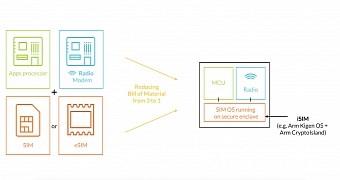ARM announced today that it plans to release new chips with integrated SIM card support for the next wave of IoT (Internet of Things) devices.
The semiconductor and software design company shares its vision of a trillion connected devices by the year 2035 all having a secure identity that enables service providers to require authentication of these devices to establish trust. ARM says that this can only be possible if SIM support is built into processors.
To provide secure identity in cellular IoT (Internet of Things) apps for service providers and hardware manufactures alike, ARM is launching today new technologies that are compliant with the GSMA Embedded SIM specifications, which will allow the integration of a SIM identity, cellular modem, and MCU into a single processor.
"Forecasts predict up to 4.4B IoT devices will be cellular-enabled by 2025 (Machina, 2017). This solution enables SIM identity - with its associated security levels - at a much lower price point and with greater flexibility of deployment," says Paul Williamson, Vice President and General Manager of IoT Device IP Line of Business at Arm.
Reduced manufacturing costs, bigger batteries, smaller devices
The new technologies launched by ARM today also promise to significantly reduce the manufacturing cost of the next wave of IoT devices, including smartphones, tablets, appliances, and other embedded devices. In addition, it could make room for bigger batteries or lead to smaller device size.
With this, ARM hopes for other chip makers to adopt embedded SIM (eSIM) and integrated SIM (iSIM) form factors, which the company says that are essential to offer secure identity to the next wave of cellular IoT devices. Check out the attached diagram to see how ARM's embedded SIM support will work in its future chips.

 14 DAY TRIAL //
14 DAY TRIAL //